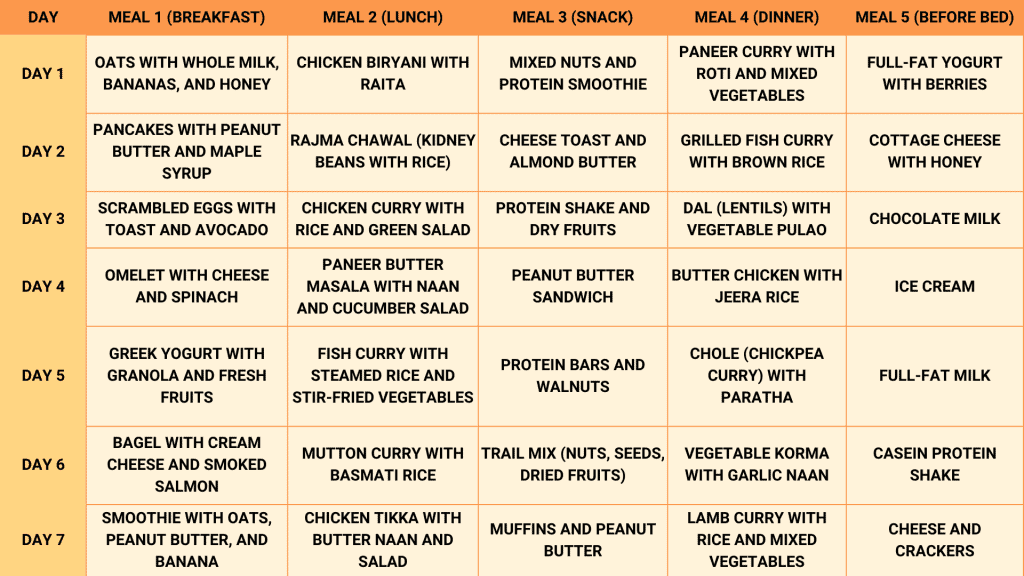To gain 4 kg weight in a week is a challenging and ambitious goal that needs strategic approaches both at the dieting table and in lifestyle. This means you must consume much more than your body burns. On average, 1 kg of weight gain accounts for around 7,700 calories, so if one wants to gain 4 kg weight in a week, they will need around 30,800 calories in excess. This is equivalent to consuming 4,400 extra calories per day. Concentrate on high-calorie, nutrient-dense food for maximum calorie consumption without weighing your body down. Import more meals and snacks containing proteins, healthy fats, and carbohydrates, which can boost weight gain efficiently. Reducing activities that burn excess energy and proper rest will also optimize your body’s efficiency in holding the added energy as body mass.
Let’s dive into how to gain 4 kg weight in a week by looking at easy ways to eat more and train harder for better results.
Can You Gain 4 Kg In A Week?
Yes, technically speaking, you can gain 4 kg weight in a week with great dedication, good dietary planning, and the ability to take more calories than you would burn daily, which is critical to gaining that much in one week. That would amount to 30,800 extra calories for the week or approximately 5,500 extra calories a day. In other words, this means consuming the quantity Dwayne “The Rock” Johnson consumes daily, over and above your regular intake. The catch here, however, is that not all the weight gained may be in muscle mass-all the weight may likely be in terms of fat and water if the increase in calorie intake is not accompanied by appropriate strength training or physical activity.
It can also lead your body to several risks, such as digestive problems, fatigue, or even metabolic stress. It is possible, but most practitioners do not recommend weight gain in such increments without professional interaction.
For those asking, “Can I gain 4 kg in a week?” The key is to combine high-calorie meals with strength training.
10 Ways on How to Gain 4 kg Weight in a Week
The most effective method for how to gain 4 kg weight in a week will challenge your understanding of conventional weight-gain wisdom. Still, it is achievable with the right combination of calorie-dense nutrition, focused exercise, and lifestyle adjustments. This rapid weight gain requires a targeted plan that balances muscle mass increase and controlled fat accumulation. Below are 10 proven strategies, supported by scientific research, to help you gain 4 kg weight in a week.
1. Eat More Calories
Caloric surplus, the general basis of weight gain, contains the consumption of high calorie foods compared to those expended daily. To gain 1 kg of body weight, approximately 7,700 calories are required; to gain 4 kg weight in a week, the total volume of the surplus amounts to approximately 30,800 calories. This sums to a surplus of around 4,400-5,000 calories on top of your daily caloric needs. Encourage consumption of nutrient-dense, calorie-rich foods, including avocado, nuts, peanut butter, and full-fat dairy products. For example, two tablespoons of peanut butter contains almost 188 calories; one avocado contains about 250 calories. The secret is that calorie-dense food is included in every meal so that not a large amount will be consumed.
2. Increase Protein Intake
Protein contributes to gaining weight by adding muscle and controlling fat accumulation. This 1.6 to 2.2 grams of protein ingestion per kilogram of body weight allows the body to provide the necessary building blocks to repair and grow muscles. A report has shown that those who consume a diet high in protein have gained leaner muscles than those following a diet rich in lower protein intakes, especially when the calories of these individuals are increased. Good sources of lean meats, eggs, and fish include: A chicken breast gives about 165 calories and 31 grams of protein. An egg can give up to 6 grams of protein and 70 calories.
3. Focus on Calorie-Dense Foods
High-calorie density is significant because an individual can consume loads of calories without feeling “stuffed.” All the given are high-calorie foods and are straightforward enough to be added to diets: dried fruits, whole grains, seeds, and oils. For example, 28g of almonds will give 160 calories; a tablespoon of olive oil equals 120 calories and can be drizzled over salad or added to meals freely. The majority of the calories come from whole grains, such as oats and quinoa, but critical nutrients from fiber, B vitamins, and minerals don’t get wasted; they balance your diet because of the calorie load.
4. Utilize Supplements
Mass gainers and other supplements may be a good weapon for high caloric intake daily. Most mass gainers contain nearly 1,000 calories per serving, along with high protein and high carbohydrates. According to studies, most supplements, including whey protein, stimulate muscle protein synthesis, and while doing resistance training, these blends can create muscle growth. Select good mass gainers containing quality carbohydrates, little sugar, and artificial additives. They do not build lean muscle mass and are stockpiled into fat.
5. Avoid Drinking Water Before and During Meals
Hydration is necessary, but so is timing it correctly when someone is looking to increase calorie intake. Water is essential but will fill the stomach and reduce hunger, reducing calories. Researchers found that hydration leading up to meals decreased food intake by 22% and made it impossible to meet the calorie requirements of an individual. Hydration for peak calorie intake is to be done between meals and not before meal times. Thus, one would always be hungry during the eating windows.
6. Incorporate Weight Training
Weight would also be gained with resistance training, but it would be from muscle rather than fat. Compound exercises like squats, deadlifts, and bench presses concentrate on larger muscle groups and induce hypertrophy muscle growth. In the context of multiple studies, the possibility of progress overload and high-protein diets more easily allowing for muscular hypertrophy within relatively shorter and extended periods when a caloric surplus is also present becomes important. With the addition of 4-5 strength training sessions a week, periodized with heavy lifts and progressive weight gain, further muscle growth will be driven alongside calorie increases.
7. Drink High-Calorie Beverages
Liquid calories can also be used to ingest more calories without feeling too full. Smoothishakes can serve as a medium for adding other calorie-dense ingredients such as full-fat yogurt, oats, peanut butter, and protein powder. For instance, if you blend one banana, 1 cup whole milk, 2 tbsp. Peanut butter and a scoop of protein powder, then you’ll end up with over 700 calories in that shake very easily. Since liquid calories are generally less filling than solid foods, it would provide supplementary opportunities for caloric intake without overwhelming the appetite.
8. Snack on High-Fat Foods
Indeed, fat is the most energy-dense macronutrient, with nine calories per gram, whereas protein and carbohydrates contain four calories per gram. In this respect, such a high consumption of fat-rich food may yield the required calorie intake. For example, 1 ounce of macadamia contains about 200 calories, and 100g of dark chocolate yields 600 calories. With high-energy density, you eat relatively small portions with very high caloric intake, which makes them most suited for those requiring quick amounts of calories.
9. Eat Frequently and Increase Meal Sizes
This should be eaten throughout the day to prevent bloating at any one meal but will contribute to a higher total calorie intake. Go for 5-6 meals daily, all with protein, carbs, and fats. You may also try the keto diet to gain weight. A study concluded that eating multiple small meals will assist with weight gain as your body is constantly supplied with energy and nutrients. Another crucial factor would be the scheduling of meals. Eat every 2-3 hours, so your body is constantly supplied with calories to fuel muscle growth while storing as little fat as possible.
10. Prioritize Sleep and Recovery
This is the period when the body renews itself, and a study reported that sleeping for less than 6 hours can bring muscle-impaired repair, increase drag on metabolism, and weaken resistance training. Thus, the 7-8 hours of nightly sleep quality should be essential to enable your body to stock calories above your basic maintenance calories and construct new tissues. Good sleep will also help regulate hormones such as cortisol, which can interfere with muscle-building and make unnecessary body fat deposits without good sleep hygiene.
Eating more is key, but if you want to succeed, you need to learn more about how to gain 4 kg in 7 days.
Foods to eat when gaining 4 kg weight in a week
This process requires the most effective use of calorie-dense foods with the proper nutrient-rich content to gain 4 kg in a week. Food items that increase caloric intake, support muscle growth, and provide essential nutrients are required here. Here are the best foods you need to include in your diet to gain weight quickly while being healthy.
1. Nuts and seeds
Nuts and seeds are high-calorie ingredients rich in healthy fats, making them ideal for high-calorie weight gain. The most concentrated segments are nuts, seeds, almonds, peanuts, and sunflower seeds. For example, 1 ounce, or 28g of almonds, is about 160 calories and 6g of protein, with 14g of fats. Nuts contain loads of polyunsaturated and monounsaturated fats, which are good for the heart but at the same time lead to weight gain. Nuts and seeds are highly rich in fiber, promoting the digestive process, so they may be an effective and healthy source of supplementing calories.
2. Milk Products
Dairy, including whole milk cheese and yogurt, is excellent for weight gain and calorie-dense. One cup of whole milk provides about 150 calories; cheese is 110 calories per ounce, except for some extremely high-fat-content ones, like cheddar. In general, both protein and fat in the dairy promote muscle growth best when accompanied by resistance training. Milk protein is said to stimulate muscle repair and body growth positively. This is because of its slow rate of digestion and high level of amino acids, especially casein and whey.
3. Red Meat
Red meats that may be included are beef, steak, and lamb in protein rich foods, which are exceptionally calorific yet high in protein and fatty, hence ideal for weight gain. Beef is typically 250 calories, 26 grams of protein, and 15 grams of fats in a 100-gram serving. Some other naturally occurring substances present in red meats are creatine. The chemical enhances muscle tissue energy production, hence adding muscle mass. Red meats also contain high amounts of heme iron; with B vitamins, they can be consumed simultaneously to benefit health so that the energy level will be adequately maintained during the attempts to gain weight. Studies have proven that if a person consumes red meat in a high-calorie diet, then there would be increased muscle mass gains compared with the less animal-based protein diet.
4. Fatty Fish
The fish are the healthy fats and omega-3 fatty acids that are found in salmon, mackerel, and sardines make oily fish. Oily fish is calorie-rich, so 100 grams of salmon will provide about 206 calories and 13 grams of fat. Omega-3s specifically are anti-inflammatory and assist with muscle recovery and growth. Thus, oily fish forms an excellent protein source for someone trying to gain weight rapidly. Other oily fish, such as salmon, contain high amounts of proteins, about 20 grams per serving, and contribute to muscle synthesis since one generates high-quality calories.
5. Whole Grains
Other more intact whole grains include brown rice, oatmeal, and quinoa, where all the complex carbohydrates and other much-required nutrients are retained. These result in slow-releasing energy, providing a steady, low-grade calorie supply throughout the day. A cup of cooked quinoa contains approximately 220 calories with 8 grams of protein and 5 grams of fiber; thus, it is high-calorie and nutrient-dense for weight gain. Whole grains are rich in essential vitamins and minerals such as magnesium and B vitamins that promote efficiency in using energy and muscle function. Thus, whole grains play a fundamental role in achieving healthy weight gain.
6. Avocados
Avocados have tonnes of calories and healthy fats, which are almost 250-300 calories in a medium-sized avocado, with 23 grams of fat, all of which are heart-healthy monounsaturated fats that allow you to consume calories without any ill effects caused by unhealthy saturated fats. Along with fats, avocados better equip you with all the necessary vitamins, such as vitamin E, potassium, and fiber, making you healthy while reaching your calorie goals.
7. Eggs
Eggs are a complete protein, which implies they provide all nine essential amino acids that develop the muscle. One big egg possesses 70 calories, 6 grams of protein, and 5 grams of good fats. So, with all their versatility, eggs ensure weight gain in various foodstuffs prepared and ingested throughout the day. For example, eggs also contain very high concentrations of nutrients. They are rich in vitamin D and choline, which enhances the health of bones as well as cognitive functions. Nutrient-dense eggs are undoubtedly good candidates to help someone quickly gain weight and muscular mass.
8. Nut butters
Nut butter, such as peanut butter for weight gain or almond butter, has an energy density of about 190 calories in a 2-tablespoon serving. High in fats, proteins, and fibers, nut butter can become a source of calorie addition, which may not require a high intake volume. Nut butter also contains high amounts of micronutrients, including magnesium and vitamin E, which gives it general health benefits aside from conferring concentrated energy, making it ideal for mixing in with any snack or smoothie.
9. Yogurt, Full-Fat
Full-fat yogurt is another good addition to the diet for weight gain because it provides the ideal mix of protein, fat, and carbohydrate content. One cup of full-fat yogurt contains almost 150 calories, 8 grams of protein, and 8 grams of fat. The existing probiotics support digestion and fat intake, increasing the number of calories in the diet. Yogurt can be mixed with fruits, nuts, and honey to create a calorie-dense foodstuff.
10. Dry fruit
Raisins, apricots, and dates are concentrated food items of calories and natural sugars. Although a handful of raisins weigh 40 grams and contain 120 calories, dried fruits are one of the easiest and most convenient ways to increase calorie intake. The sugars in dried fruits make for good natural sources of quick energy, and the fiber will encourage healthy digestion. In addition to the nutrients mentioned above, dried fruits also contain antioxidants and vital vitamins such as potassium and vitamin C, thus making you generally healthy while helping you reach your weight gain goals.
Many wonder, regarding fast weight gain, “Can I gain 4 kg in a week?” The answer lies in smart nutrition.
Diet Plan to Gain 4 kg in a Week
For those looking for a diet plan, here’s a sample meal plan to help you gain 4 kg weekly. It might seem challenging, but once you know how to gain 4 kg weight in a week, it becomes much easier to follow a routine. This plan includes five meals daily, rich in calories and nutrients, ensuring a steady calorie intake. Gaining weight fast might seem hard, but we’ll break down how to gain 4 kg in 7 days step by step.
Day 1
- Meal 1 (Breakfast): Oats with whole milk, bananas, and honey
- Meal 2 (Lunch): Chicken biryani with raita
- Meal 3 (Snack): Mixed nuts and protein smoothie
- Meal 4 (Dinner): Paneer curry with roti and mixed vegetables
- Meal 5 (Before bed): Full-fat yogurt with berries
Day2
- Meal 1 (Breakfast): Pancakes with peanut butter and maple syrup
- Meal 2 (Lunch): Rajma chawal (kidney beans with rice)
- Meal 3 (Snack): Cheese toast and almond butter
- Meal 4 (Dinner): Grilled fish curry with brown rice
- Meal 5 (Before bed): Cottage cheese with honey
Day 3
- Meal 1 (Breakfast): Scrambled eggs with toast and avocado
- Meal 2 (Lunch): Chicken curry with rice and green salad
- Meal 3 (Snack): Protein shake and dry fruits
- Meal 4 (Dinner): Dal (lentils) with vegetable pulao
- Meal 5 (Before bed): Chocolate milk
Day4
- Meal 1 (Breakfast): Omelet with cheese and spinach
- Meal 2 (Lunch): Paneer butter masala with naan and cucumber salad
- Meal 3 (Snack): Peanut butter sandwich
- Meal 4 (Dinner): Butter chicken with jeera rice
- Meal 5 (Before bed): Ice cream
Day 5
- Meal 1 (Breakfast): Greek yogurt with granola and fresh fruits
- Meal 2 (Lunch): Fish curry with steamed rice and stir-fried vegetables
- Meal 3 (Snack): Protein bars and walnuts
- Meal 4 (Dinner): Chole (chickpea curry) with paratha
- Meal 5 (Before bed): Full-fat milk
Day6
- Meal 1 (Breakfast): Bagel with cream cheese and smoked salmon
- Meal 2 (Lunch): Mutton curry with basmati rice
- Meal 3 (Snack): Trail mix (nuts, seeds, dried fruits)
- Meal 4 (Dinner): Vegetable korma with garlic naan
- Meal 5 (Before bed): Casein protein shake
Day 7
- Meal 1 (Breakfast): Smoothie with oats, peanut butter, and banana
- Meal 2 (Lunch): Chicken tikka with butter naan and salad
- Meal 3 (Snack): Muffins and peanut butter
- Meal 4 (Dinner): Lamb curry with rice and mixed vegetables
- Meal 5 (Before bed): Cheese and crackers
By sticking to a clear plan, understanding how to gain 4 kg in 7 days becomes a matter of eating more calories and lifting weights.
How to calculate daily calorie intake for gaining 4 kg weight in a week?
Now, you have to calculate the calorie intake for gaining 4 kg per week using Daily calorie intake calculator. For this, first, you have to calculate your BMR and then add a tremendous amount of calorie surplus to it. Your BMR is the number of calories your body burns if you have to do the bare minimum things such as breathing, digesting food, sleeping, etc. And if you are one of them and look forward to gaining weight, then you require an excess of 7,700 calories for every kilogram of your body weight. So you would have 30,800 calories a week if you wanted to know how to gain 4 kg in 7 days.
Calculate your BMR using the Mifflin-St Jeor Equation or BMR calculator:
- For men: BMR = 10 × weight (kg) + 6.25 × height (cm) – 5 × age (years) + 5
- For women: BMR = 10 × weight (kg) + 6.25 × height (cm) – 5 × age (years) – 161
For example, if a 25-year-old male weighs 60 kg, is 175 cm tall, and leads a sedentary lifestyle, his BMR would be around 1,600 calories per day.
Add your activity level to the BMR:
- Sedentary (little or no exercise): BMR × 1.2
- Lightly active (light exercise/sports 1-3 days/week): BMR × 1.375
- Moderately active (moderate exercise/sports 3-5 days/week): BMR × 1.55
- Very active (hard exercise/sports 6-7 days a week): BMR × 1.725
If the same person is moderately active, the total daily calorie need would be approximately 2,480 (BMR × 1.55).
Add a calorie surplus of 5,500 calories daily for the 4 kg weight gain goal. In this case, the individual must consume about 7,980 calories daily (2,480 + 5,500). It’s essential to track your intake and adjust as necessary, but rapid weight gain like this is often difficult and could have long-term health impacts. Therefore, using a food calorie calculator is a must.
Is it healthy to gain 4 kg weight in a week?
Gaining 4 kg in just a week is not healthy for most people because weight gained this way may also lead to several potential health issues as it tries to strain the body. Typically, the body can’t handle so many calories at one time. If this happens, it may cause diarrhea or abdominal pain, sleepiness, and the accumulation of excess fat rather than the formation of lean muscles. Moreover, extreme caloric surplus might overwhelm the liver and kidneys, leading to metabolic stress.
Another rapid increase in weight, especially in fat, may lead to fat accumulation around organs that puts the individual at risk of getting metabolic diseases such as Type 2 diabetes or heart conditions. Such weight gain that is made of fats mainly may result in blood sugar fluctuations, which may not be healthy in the long term. To be a healthy weight gain program it can be achieved more slowly and sustainably rather than seeking results like those above, which allows your body to adjust and absorb nutrients. Always consult a healthcare professional before implementing extreme methods for weight gain.
Expert Review on How to Gain 4 kg Weight in a Week
A gain of 4 kg per week is an aggressive goal requiring a structured approach. Experts do not recommend this weight gain since it does not favor the body’s balancing mechanisms. According to a nutritionist, Dr. Ken Berry, this may be easily achieved with calorie-dense food, but most of the weight will probably be from fat and water rather than muscle. He targets the consumption of the right quantity rather than the amount of the calorie inputted, ensuring that the inputted energy comes in the way of nutrient calories rather than empty calories. Weightlifting and resistance training should also be undertaken for muscle growth instead of fat storage. He adds that a slower rate of weight gain would accomplish healthier outcomes in the long term. According to him, it can lead to digestive problems and rapid fat accumulation, which isn’t good in the long run.
References
“Athletes’ nutritional demands: a narrative review of nutritional requirements.” n.d. NCBI. Accessed September 19, 2024. https://www.ncbi.nlm.nih.gov/pmc/articles/PMC10848936/.
“The Effects of Overfeeding on Body Composition: The Role of Macronutrient Composition – A Narrative Review.” 2017. NCBI. https://www.ncbi.nlm.nih.gov/pmc/articles/PMC5786199/.
“International society of sports nutrition position stand: diets and body composition.” 2017. NCBI. https://www.ncbi.nlm.nih.gov/pmc/articles/PMC5470183/.
FAQs
1. How to put on 4 kg quickly?
To gain 4 kg quickly, you must consume significantly more calories than your body burns. This can be done by eating calorie-dense foods, drinking high-calorie beverages, and adding snacks between meals. Aim for a daily calorie surplus of at least 5,000 calories over your baseline requirement. Focus on nutrient-rich foods like nuts, seeds, dairy, and protein-rich meals. Strength training will also help you gain muscle mass rather than just fat.
2. How much do I need to eat to gain 4 kg?
To gain 4 kg, you must consume approximately 30,800 extra calories over one week. This breaks down to about 5,500 additional calories per day. For an average adult, this might involve eating double or even triple your usual portions, including high-calorie foods like full-fat dairy, red meats, nuts, and oily fish.
3. Why did I gain 4 kg in a week?
Gaining 4 kg in a week could be due to a combination of factors, including increased calorie consumption, water retention, and fat accumulation. If you’ve been eating more salty or carb-heavy foods, your body may hold onto extra water, leading to rapid weight gain. It’s also possible that you’re consuming more calories than you’re burning, which results in fat gain.
4. Can I gain 4 kg in a week?
You can gain 4 kg in a week, but it requires a dedicated effort to eat a massive caloric surplus—around 5,500 extra calories per day. This kind of rapid weight gain is not usually recommended without medical supervision, as it can lead to health issues such as excessive fat accumulation, digestive problems, and metabolic stress.










